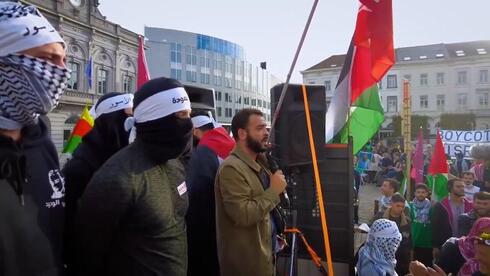The decision was announced this week, following recommendations from Belgian intelligence services. Authorities said Khatib poses a “security threat” due to his repeated praise for Palestinian armed groups and his leadership role in Samidoun.
“Khatib is a radical hate preacher who openly supports groups like Hamas and the PFLP,” said former State Secretary for Asylum and Migration Nicole de Moor, who initiated the process. “There is no place in Belgium for extremists who glorify terrorism.”
Khatib has denied being a member of either group but has publicly expressed admiration. “I’m not a member, but I respect and admire them,” he said. The PFLP has named him as one of its members in its official publications.
Tensions escalated after the October 7 Hamas-led attack on Israel. The day after the assault, Samidoun published an image of a paraglider with the slogan “From the river to the sea,” widely seen as endorsing the massacre. Belgian MP Michael Freilich called the post a “calculated glorification of terror,” adding, “While the bodies were still being counted, Samidoun celebrated and branded the killers as heroes.”
Khatib defended the attack, calling it “a normal reaction of a population living under colonialism.” He added, “I respect them. Through their blood and sacrifice, they guarantee my existence.” He does not recognize Israel’s right to exist, has called the two-state solution “racist” and supports dismantling the Israeli state.
In May 2024, Samidoun hosted a “Resistance Festival” in Brussels. Hamas political bureau member Basem Naim spoke to attendees via video, praising their “unwavering resistance” and expressing hope for “victory from the river to the sea.”
Belgium’s Coordination Unit for Threat Analysis (CUTA) has listed Khatib as a “hate preacher.” Intelligence officials recommended stripping him of his refugee status earlier this year.
Samidoun has already been banned in Germany, the United States and Canada over ties to the PFLP and its role in spreading extremist propaganda. In the Netherlands, parliament has called on the government to designate Samidoun a terrorist organization.
Freilich, who has long campaigned against Khatib and Samidoun, praised the move. “This is a crucial step. We must protect our democracy from those who abuse it,” he said. “I will keep pushing for a complete ban on Samidoun in Belgium.”
Khatib has said he plans to appeal the decision, calling it “political repression” against a stateless Palestinian. His recognition as a refugee under the United Nations Relief and Works Agency (UNRWA) and protection under the 1951 UN Refugee Convention may complicate deportation efforts.
In a statement, Samidoun called the move “part of a broader attack on the Palestinian population in Belgium” and pledged to fight it in court and on the streets.
More than 250 academics signed an open letter supporting Khatib, warning that revoking his status sets a “dangerous precedent” and threatens freedom of expression.


